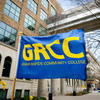At Grand Rapids Community College (GRCC) in Michigan, there’s no wrong way for a student to ask for help.
Founded in 1914—Michigan’s first community college—the school aims to make that ask as easy as possible, with centralized basic needs supports, a staff and faculty educated about those supports, a robust “get help” page, and an electronic navigational system that keeps track of students’ requests and referrals.
And when help requires government support, GRCC does things differently.

Marjri Weller, a GRCC alumna, returned to the college in October 2022 when it created an innovative new position to support students’ basic needs. The position—a basic needs specialist or caseworker—is jointly funded by GRCC and the Michigan Department of Health and Human Services (MDHHS). She is currently the only MDHHS specialist/caseworker who is assigned to work at a college in the entire state.
Weller, who has been a Family Independence Specialist at MDHHS for the last 13 years, plans to spend two years in her new role at GRCC, connecting students to government supports such as the Supplemental Nutrition Assistance Program (SNAP), child care services, and Michigan’s many housing programs. With nearly 70% of SNAP-eligible students not receiving the benefit, a position like Weller’s can make a significant impact on their basic needs security.
“I ask [students] things like, 'would you like me to apply to that for you?'” Weller says. “I'm here to help students in any way I can—whether that is with food, child development and care, state emergency relief, Medicaid, or any of the programs that we offer."
In bringing Weller to campus, “GRCC is helping sustain the momentum we've seen lately around institutions hiring dedicated basic needs staff,” says David Thompson, a practitioner-researcher at The Hope Center. “The partnership also echoes recent efforts to build relationships between higher education institutions and state agencies to improve support for students' basic needs. Weller's role is particularly exciting, though, because it's a model we haven't seen before that has tremendous potential to foster a more individualized—and ultimately successful—process for students to access available resources.”
Weller’s goal is for every student to feel as though she’s supporting them as humans—an extension of GRCC’s culture of care. She makes sure to get to know each student, their history with support services, and the full breadth of their needs.
“It makes a student feel like they’re more than just a number,” she said. “Everybody thinks ‘Marjri is my worker, she works for me.’”
I'm here to help students in any way I can—whether that is with food, child development and care, state emergency relief, Medicaid, or any of the programs that we offer.

Marjri Weller
Michigan Department of Health and Human Services
It’s not rocket science: Weller says that when students feel cared for, they’re more likely to open up to her and more willing to talk about their challenges. The one-on-one support also gives Weller the time to look into each student’s case, explain the often confusing forms and award notices, and anticipate next steps for students. Often, she says, students feel like someone else needs the support more than they do. And, as The Hope Center's research suggests, many times students don’t even know they qualify for support.
Weller’s position has taken the burden off staff to remember to whom a student has spoken, and it removes the need for students to constantly retell their story and reopen wounds. It keeps all offices and parties updated on the student’s situation.
A centralized system also prevents staff members on the front lines from feeling stuck when students go to them for help. If a particular support or office can’t provide the support a student needs, they won’t just be turned away. They’ll be logged in to the system and redirected to the right service.
A data sharing agreement between GRCC and MDHHS allows Weller to move promptly in helping students. For example, if a parenting student is in need of child care services, she can pull up both the student’s schedule and those of child care service providers offered by the state. In essence, Weller is a basic needs concierge for students, allowing them to be just that: students.
How your college can follow suit
The team at GRCC says that it all started with data.
In 2016, GRCC participated in The Hope Center Survey of Student Basic Needs and found that 45% of their students experienced food insecurity, 36% experienced housing insecurity, and 9% were homeless. Upon seeing the results, the college’s strategic leadership team engaged in a mass movement to address students’ basic needs—one of their equity goals.
Sandy Gregory, the assistant to the dean of student success at GRCC, says that collecting data on student basic needs—even if you’re not yet sure what it will be used for—can identify problems your institution faces, build buy-in from leaders for potential projects, and give a point of comparison to evaluate the efficacy of future programs.
As for procuring funding for institutional basic needs support for a role like Weller’s, or for any other effort, the GRCC team said that their data collection and their efforts to educate the campus community about the reality of basic needs made the difference.
“We gave them [institutional leaders at GRCC] arguments and data and stories that made it almost impossible for them to say no,” said Lina Blair, Director of Student Life and Conduct at GRCC.
Blair also recommends paying close attention to the timing of when the fiscal year of your state’s DHSS begins. By contacting them at the right time with clear goals and expectations, the position can be implemented smoothly into their regular budgeting process.
In addition to Weller’s role, GRCC hopes to normalize the conversation around basic needs through efforts like a mandated basic needs support syllabus statement, food and snack pantries across campus, and many days of education for faculty and staff on the reality of basic needs insecurity at GRCC. It’s not just a position that Weller provides, but a whole ecosystem of support.
As for those looking to enter a role like Weller’s, her advice is simple: be flexible, adaptable, caring, and have an open heart.
“You have to love on the people that need help,” she said.
You have to love on the people that need help.



